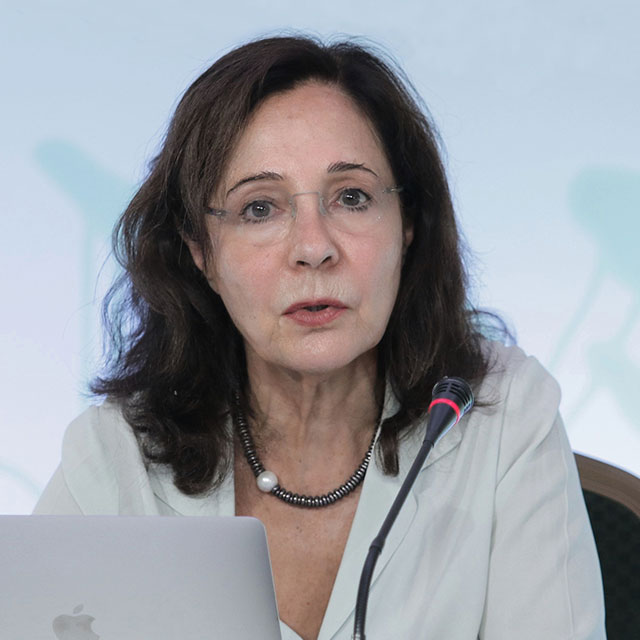The Board of Directors is the highest governing body of Quest Holdings (or Company) and is responsible for the management of the company, its assets and the realization of its purpose. In addition, and in cooperation with the Management of the subsidiary companies, it has the ultimate responsibility for the Group's strategy, the establishment of the Group's priorities, general principles and policies. According to the Company's Articles of Association, the BoD shall consist of a minimum of seven (7) to a maximum of ten (13) members, who may be executive, non-executive and independent non-executive members.

Mr Fessas is the founder and main shareholder of the company Quest Holdings S.A.. Quest Holdings, founded in 1981 (as Info-Quest), is listed on the Athens Stock Exchange (1998) and operates through its subsidiaries in the field of information technology, e-commerce, courier services, renewable energy sources, and air conditioning products and services. He is also a major shareholder and Chairman of the listed property management company BriQ Properties SA.
He has served as the Chairman of the Board the Hellenic Federation of Enterprises (SEV) (2014-2020), he is the Honorary President of the Federation of Hellenic Information Technology & Communications Enterprises (SEPE).
He holds a degree in Mechanical-Electrical Engineering from the National Technical University of Athens and a Master's degree in Thermodynamics from the University of Birmingham, Great Britain.

Efi Koutsoureli is Vice Chairwoman of the Board of Directors of Quest Holdings S.A. and also member of the Board of Directors in the Group's companies. Her studies were in Business Administration and Economics at Deree College, Athens. Having begun her own business activity in the commercial trade sector, she then collaborated with Info-Quest from its commencement with a shareholder relationship, while in 1984 she became a founding member during the transformation of the company into a Société Anonyme (SA). She managed various company functions, contributing to the dynamic development and evolution of the company into a Group of companies with activities in the fields of Information Technology and Digital Technology, Postal Services and Renewable Energy Sources. For several years, she was of the Head of the Marketing and Communication section, while at present she is actively involved with the Corporate Affairs of the Group and its companies.
In 2013,she personally undertook the initiative in leading the efforts to lay the foundations of the transformation of the Group in response to the new requirements, demands and philosophy that govern the era of Sustainable Development, while strengthening the corporate governance value system and at the same time advancing the organization through digital innovation for the new era and promoting a culture of equality and diversity within the Group's companies.
During the period 2007-2010 she was a member of the Board of Directors of the Federation of Hellenic ICT Enterprises (SEPE) in Greece and has served as a member of the Board of Directors to various other organizations and charitable foundations, many which she continues to this day.
 Independent Advisor on Climate - Oceans Acting as an independent consultant in global organisations, Maria Damanaki is serving as an advisor for Oceans5 (USA) and Rockefeller Brothers Foundation (USA). She is a member of the Friends of Ocean Action of the World Economic Forum. She co-chairs the network of the High-Level Ocean Panel and she sits on the Boards: Monaco Ocean Foundation and Oceanographic Institute, European Marine Regions Forum(Berlin), Global Fishing Watch (Partnership of Google and Oceana, USA), Marine Stewardship Council (MSC-London), Global Fund for Coral Reefs (GFCR UN New York), Beneath the Waves (USA). She also serves as a visiting professor on Marine Policy in NOVA University of Lisbon.
Independent Advisor on Climate - Oceans Acting as an independent consultant in global organisations, Maria Damanaki is serving as an advisor for Oceans5 (USA) and Rockefeller Brothers Foundation (USA). She is a member of the Friends of Ocean Action of the World Economic Forum. She co-chairs the network of the High-Level Ocean Panel and she sits on the Boards: Monaco Ocean Foundation and Oceanographic Institute, European Marine Regions Forum(Berlin), Global Fishing Watch (Partnership of Google and Oceana, USA), Marine Stewardship Council (MSC-London), Global Fund for Coral Reefs (GFCR UN New York), Beneath the Waves (USA). She also serves as a visiting professor on Marine Policy in NOVA University of Lisbon.
 Mr. Georgantzis holds the position of CEO of Quest Holdings from the end of 2015 while he holds the position of CEO of ACS S.A. since the end of 2003. He has studied Mechanical Engineering at Imperial College of Science Technology and Medicine (Great Britain) where he completed his postgraduate studies and holds a BEng and MSc. He has worked as an executive, freelancer and entrepreneur in various positions in the fields of construction, investment and IT. Mr. A Georgantzis was born in Piraeus in 1968, speaks English and French and is married with two children.
Mr. Georgantzis holds the position of CEO of Quest Holdings from the end of 2015 while he holds the position of CEO of ACS S.A. since the end of 2003. He has studied Mechanical Engineering at Imperial College of Science Technology and Medicine (Great Britain) where he completed his postgraduate studies and holds a BEng and MSc. He has worked as an executive, freelancer and entrepreneur in various positions in the fields of construction, investment and IT. Mr. A Georgantzis was born in Piraeus in 1968, speaks English and French and is married with two children.
 He was born in 1959 in Piraeus. He studied Economics at the University of Piraeus and is a graduate of the annual MBA course of the Hellenic Management Association (HMA) and the annual Management Program of the International Federation of Periodical Publishers (FIPP). He has experience in numerous business sectors from different management positions, such as Financial Manager, Operations Manager, CFO and General Manager. He joined Quest Group in 2003 as the General Financial and Administration Director of the Group.
He was born in 1959 in Piraeus. He studied Economics at the University of Piraeus and is a graduate of the annual MBA course of the Hellenic Management Association (HMA) and the annual Management Program of the International Federation of Periodical Publishers (FIPP). He has experience in numerous business sectors from different management positions, such as Financial Manager, Operations Manager, CFO and General Manager. He joined Quest Group in 2003 as the General Financial and Administration Director of the Group.
 Mr. Emil Yiannopoulos is Member of the Chartered Institute of Internal Auditors of England and Wales FCA, ICAEW since 1980. He was born in London and studied in England (graduate of Southgate College, London, with a degree in Business Strategy and Economics). Member of the supervisory board of the Institute of the Chartered Institute of Internal Auditors of England and Wales (ICAEW) from 2017 to 2019 representing the members of Europe and Eurasia. He has been an Executive of PwC London for 13 years, PwC of Greece (Athens) for 26 years, and PwC of USA and Bermuda. He has been a partner of PwC Greece since 1994 and Executive Committee member for 15 years. He has held senior leadership positions such as Audit and Assurance practice leader in PwC of Greece (Athens). Founded in 1994 and led PwC’s Deals and Transaction Advisory Services business until 2009. Founded in 2008 and led PwC Greece’s NPL advisory team. Advisor to Greek banks and foreign buyers of relevant loan portfolios. Independent non-executive Member of the BoD of Quest Holdings and President of the Audit Committee since June 2021. Since March 2022, independent non-executive Board Member of Attica Bank and President of the Remuneration, Nomination and Corporate Governance Committee and member of the Audit and Risk Committee. Non-executive Member of the BoD of PQH (Single Special Liquidator for all 17 credit and financial institutions under special liquidation in Greece) from 2016 until March 2022. Former Honorary Non-executive treasurer, on the Board of Trustees of Campion School and St Catherine’s School.
Mr. Emil Yiannopoulos is Member of the Chartered Institute of Internal Auditors of England and Wales FCA, ICAEW since 1980. He was born in London and studied in England (graduate of Southgate College, London, with a degree in Business Strategy and Economics). Member of the supervisory board of the Institute of the Chartered Institute of Internal Auditors of England and Wales (ICAEW) from 2017 to 2019 representing the members of Europe and Eurasia. He has been an Executive of PwC London for 13 years, PwC of Greece (Athens) for 26 years, and PwC of USA and Bermuda. He has been a partner of PwC Greece since 1994 and Executive Committee member for 15 years. He has held senior leadership positions such as Audit and Assurance practice leader in PwC of Greece (Athens). Founded in 1994 and led PwC’s Deals and Transaction Advisory Services business until 2009. Founded in 2008 and led PwC Greece’s NPL advisory team. Advisor to Greek banks and foreign buyers of relevant loan portfolios. Independent non-executive Member of the BoD of Quest Holdings and President of the Audit Committee since June 2021. Since March 2022, independent non-executive Board Member of Attica Bank and President of the Remuneration, Nomination and Corporate Governance Committee and member of the Audit and Risk Committee. Non-executive Member of the BoD of PQH (Single Special Liquidator for all 17 credit and financial institutions under special liquidation in Greece) from 2016 until March 2022. Former Honorary Non-executive treasurer, on the Board of Trustees of Campion School and St Catherine’s School.
 Ms. Ioanna Dretta holds a degree in Civil Engineering from NTUA, a MSc from Imperial College London, and a Master in Public Administration from Harvard Kennedy School. She is CEO of REDS of the ELLAKTOR Group, developing iconic green field properties. She is the Chairperson of Marketing Greece, a non-profit company of the Greek Tourism Confederation (SETE), that aims to integrate the principles of sustainable development into Greece's tourism product. In her 20-year career, she has held senior positions in the private and public sector in different areas of economic activity, managing complex environments and recording positive results. Ioanna Dretta is an independent member of the Board of Directors of ELLAKTOR since 2021, and served as Minister of Tourism in the Sarmas Caretaker Government.
Ms. Ioanna Dretta holds a degree in Civil Engineering from NTUA, a MSc from Imperial College London, and a Master in Public Administration from Harvard Kennedy School. She is CEO of REDS of the ELLAKTOR Group, developing iconic green field properties. She is the Chairperson of Marketing Greece, a non-profit company of the Greek Tourism Confederation (SETE), that aims to integrate the principles of sustainable development into Greece's tourism product. In her 20-year career, she has held senior positions in the private and public sector in different areas of economic activity, managing complex environments and recording positive results. Ioanna Dretta is an independent member of the Board of Directors of ELLAKTOR since 2021, and served as Minister of Tourism in the Sarmas Caretaker Government.
 Mr. Panos Kyriakopoulos has been Chairman and CEO of Star Investments S.A. Cambridge Finance Ltd since July 2002, a company developing its activities in the sector of Mass Media, Infrastructure, and Technology. He is also a member of the Board of Directors of the US-listed shipping companies Euroseas Ltd, Eurodry Ltd, a member of the Board of Directors of Quest Holdings, Ellaktor, Aktor Concessions, Reds, The Greek Yellow Pages, and a member of the Board of Directors of the Hellenic Federation of Enterprises (SEV). He has served as a member of the Board of Directors of various companies such as GEK-Terna and AGET Heracles. From July 1997 to July 2002, he was the C.E.O of the Hellenic Post Group and up to 2006 a member of the BoD. From August 1996 to July 1997 Mr. Panos Kyriakopoulos was an advisor to the technical company ATEMKE S.A. From July 1986 up to July 1996 he was the Managing Director of Globe Group S.A., a group active in the areas of Shipping, Textiles, and Food . He did his national service at the Greek Army from October 1984 to June 1986. Mr. Kyriakopoulos holds a B.Sc. in Marine Engineering from the University of Newcastle upon Tyne, Great Britain. He holds a M.Sc. in Naval Architecture and Marine Engineering from the Massachusetts Institute of Technology (MIT), USA and a Master’s degree in Business Administration (MBA) from Imperial College, London. He is 60 years old, married with two children. He speaks English and French. Mr. Panos Kyriakopoulos has been decorated by the Hellenic Republic with the rank of Brigadier General of the Order of Honour, the Star of Merit and Honour and the Cross of the Order of Merit and Honour, and has been awarded a merit by the Ministers of Transport and Communications and National Economy for his service to the Hellenic Post Group.
Mr. Panos Kyriakopoulos has been Chairman and CEO of Star Investments S.A. Cambridge Finance Ltd since July 2002, a company developing its activities in the sector of Mass Media, Infrastructure, and Technology. He is also a member of the Board of Directors of the US-listed shipping companies Euroseas Ltd, Eurodry Ltd, a member of the Board of Directors of Quest Holdings, Ellaktor, Aktor Concessions, Reds, The Greek Yellow Pages, and a member of the Board of Directors of the Hellenic Federation of Enterprises (SEV). He has served as a member of the Board of Directors of various companies such as GEK-Terna and AGET Heracles. From July 1997 to July 2002, he was the C.E.O of the Hellenic Post Group and up to 2006 a member of the BoD. From August 1996 to July 1997 Mr. Panos Kyriakopoulos was an advisor to the technical company ATEMKE S.A. From July 1986 up to July 1996 he was the Managing Director of Globe Group S.A., a group active in the areas of Shipping, Textiles, and Food . He did his national service at the Greek Army from October 1984 to June 1986. Mr. Kyriakopoulos holds a B.Sc. in Marine Engineering from the University of Newcastle upon Tyne, Great Britain. He holds a M.Sc. in Naval Architecture and Marine Engineering from the Massachusetts Institute of Technology (MIT), USA and a Master’s degree in Business Administration (MBA) from Imperial College, London. He is 60 years old, married with two children. He speaks English and French. Mr. Panos Kyriakopoulos has been decorated by the Hellenic Republic with the rank of Brigadier General of the Order of Honour, the Star of Merit and Honour and the Cross of the Order of Merit and Honour, and has been awarded a merit by the Ministers of Transport and Communications and National Economy for his service to the Hellenic Post Group.

Ms. Philippa Michali is the Chair and Chief Executive Officer of NN Hellas. She is a member of the Board of Directors of the Hellenic Federation of Enterprises (SEV) and President of the Committee for Inclusion and Equality. He is also a member of the Board of Directors and the Executive Committee of the Hellenic Association of Insurance Companies and Chair of the Life and Pensions Committee. In addition, she is a member of the Board of Directors of the Hellenic-Dutch Acssociation of Commerce and Industry and of the non-profit association ALBA Executive Development & Applied Research in Business Administration. Furthermore, she is a member of the Advisory Council of the Stavros Niarchos Foundation Cultural Centre. Prior to joining the NN Group, Ms. Philippa Michali worked in the financial sector for more than 25 years in various positions, both in asset management and private insurance, including eight years as CEO of a multinational insurance company. She holds a Bachelor Degree in Banking & Financial Management from the University of Piraeus and a Master’s Degree in Business Administration (MBA) from ALBA Graduate Business School.
 Ioannis Paniaras holds a BSc and an MSc in Civil Engineering from Imperial College and an MBA in Business Administration from INSEAD. Ioannis Paniaras is currently Executive Director, Europe and Sustainability and Executive Board Member of Titan Cement International S.A. (Belgium), as well as Executive Board Member and CEO of Titan S.A. (Greece), responsible for Group activities in Greece, Albania, Bulgaria, Kosovo, North Macedonia, Serbia, Italy, France and England. He started his career at the London-based engineering consultancy KNIGHT PIESOLD. From 1998 to 2015 he held management positions in the S&B Industrial Minerals Group and - after its acquisition - in IMERYS, based in Greece and Germany, concluding his tenure there as Vice President of the former S&B's Business Division and CEO of S&B Industrial Minerals S.A. Since January 2016, he has worked for TITAN Group, initially as CEO of the Division for Greece, later taking over the Group's Corporate Affairs (sustainable development and communication). He is currently the Executive Director for Europe. He has served on several Boards, representing S&B and the TITAN Group. Ioannis Paniaras has built up extensive experience in Sustainable Development issues in Greece and internationally. In the TITAN Group, as Executive Director, he has had overall oversight for sustainable development issues from 2016 until 2022. He has also served as Chairman of the SEV Business Council for Sustainable Development from 2016 to 2021. This Council aims to promote the principles of sustainable development in business and to represent business in the public dialogue on sustainable development.
Ioannis Paniaras holds a BSc and an MSc in Civil Engineering from Imperial College and an MBA in Business Administration from INSEAD. Ioannis Paniaras is currently Executive Director, Europe and Sustainability and Executive Board Member of Titan Cement International S.A. (Belgium), as well as Executive Board Member and CEO of Titan S.A. (Greece), responsible for Group activities in Greece, Albania, Bulgaria, Kosovo, North Macedonia, Serbia, Italy, France and England. He started his career at the London-based engineering consultancy KNIGHT PIESOLD. From 1998 to 2015 he held management positions in the S&B Industrial Minerals Group and - after its acquisition - in IMERYS, based in Greece and Germany, concluding his tenure there as Vice President of the former S&B's Business Division and CEO of S&B Industrial Minerals S.A. Since January 2016, he has worked for TITAN Group, initially as CEO of the Division for Greece, later taking over the Group's Corporate Affairs (sustainable development and communication). He is currently the Executive Director for Europe. He has served on several Boards, representing S&B and the TITAN Group. Ioannis Paniaras has built up extensive experience in Sustainable Development issues in Greece and internationally. In the TITAN Group, as Executive Director, he has had overall oversight for sustainable development issues from 2016 until 2022. He has also served as Chairman of the SEV Business Council for Sustainable Development from 2016 to 2021. This Council aims to promote the principles of sustainable development in business and to represent business in the public dialogue on sustainable development.
Authorities of Corporate Bodies
The Board of Directors, as the highest governing body of the Company, is mainly responsible for:
- determining the vision, mission, values and culture of the Company;
- planning and monitoring the implementation of the Company's strategy and approving and monitoring the Company's business plan, aiming at the sustainable promotion of the corporate interest and the protection of the interests of all stakeholders;
- making decisions concerning the management of the Company, the management of its assets and generally the achievement of its objective;
- defining and supervising the corporate governance system stipulated in provisions 1 to 24 of Law 4706/2020, and periodically monitoring and evaluating, at least every three (3) fiscal years, its implementation and effectiveness, taking appropriate action to address deficiencies;
- ensuring the adequate and efficient operation of the internal audit system aiming in particular at:
- the consistent implementation of the operational strategy, with the effective use of available resources;
- the identification and management of substantial risks associated with its business activity and operation;
- the efficient operation of the internal audit unit;
- ensuring the completeness and reliability of the data and information required for the accurate and timely determination of the Company's financial position and the preparation of reliable financial statements, as well as its non-financial position in accordance with Article 151 of Law 4548/2018;
- compliance with the regulatory and legislative framework, as well as internal regulations, policies and procedures governing the operation of the Company.
- determining the extent of the Company's exposure to the risks it intends to take in the context of achieving its objective and in particular its long-term objectives and operational strategy;
- ensuring that the Company’s annual financial statements, the annual management report and the corporate governance statement, their consolidated form, as well as the remuneration report of the members of the BoD, are prepared and published in accordance with the provisions of the law and the relevant accounting standards;
- recommending to the General Meeting (or “GM”) the appointment of the certified public accountant or audit firm;
- defining a sustainable development policy and an ESG strategy;
- appointing the Committees which will support its work, and approving their Internal Rules of Procedure;
- the supervision of the implementation of its resolutions by the executive management and the overall monitoring and control of the performance of the Company and its executives;
- determining the responsibilities of the CEO, the Deputy CEO and the executive directors when appointed;
- establishing appropriate structures, reporting lines and responsibilities to achieve the Company's objectives;
- ensuring the smooth succession of its members as well as senior executives of the Company;
- its effective functioning, the systematic evaluation of its BoD as a single body, its Committees and its members, and their continuous improvement;
- ensuring the composition and operation of the BoD and its Committees in accordance with the legislation in force, as well as the compliance with any obligation arising from the legislation in force, as well as from the corporate documents and policies and procedures which govern it; and
- the other responsibilities as provided for by the Company's Articles of Association, its Internal Regulation and the applicable legislation.
In addition to the above –basically collective– responsibilities, the BoD may delegate the exercise of part or all of the management and representation powers of the Company, other than those requiring collective action, to one or more persons, members of the BoD, employees of the Company or third parties, determining at the same time the extent of such delegation.
The term of office of the members of the Board of Directors is three years (3 years), which is automatically extended until the first ordinary General Meeting after the end of their term of office, which, however, cannot exceed four years.
The members of the BoD may be re-elected and are freely revocable. Subject to the above, the term of office of the BoD may be extended until the expiry of the time limit within which the next ordinary General Meeting of the shareholders of Quest Holdings must be convened.
Under the responsibility of the Chairperson of the BoD, the Chairpersons of the Committees and the Independent Vice-Chairperson, the Board of Directors shall hold individual executive sessions.
Members of the Board of Directors, executives of the Company’s Management and of the Group’s Companies, third parties (e.g. certified public accountant appointed by the Company) and external consultants shall participate in those sessions. The sessions are included in the BoD's agenda and are usually scheduled at the beginning or end of its meeting.
The Independent Vice-Chairperson shall ensure that at least two (2) sessions are planned per year in which only non-executive members of the BoD shall participate, to discuss:
- the monitoring of the Company's strategy and its implementation, as well as the achievement of its objectives;
- any issues relating to the performance of the Executive Members of the BoD, including the monitoring and audit of their performance;
- any issues relating to the corporate governance of the Company.
In addition, the Independent Vice-Chairperson, shall ensure that the independent non-executive members of the BoD meet at least once (1) a year to prepare, if possible together, their report to the Ordinary General Meeting of the Company, as well as other reports, if required so.
The size and composition of the BoD allows for the effective exercise of its responsibilities and reflects the size, activities and strategic development plan of Quest Holdings. The BoD shall consist of a minimum of seven (7) to a maximum of ten (13) members, who may be executive, non-executive and independent non-executive members.
The selection, replacement or renewal (or not) of the term of office of the members of the BoD shall be carried out on the basis of a policy on the suitability of the members of the Board of Directors (Suitability Policy), approved by the General Meeting, aiming at the appropriate and quality staffing of the BoD for the effective fulfillment of its tasks in accordance with the business model and the strategy of the Company. The independent non-executive members are elected by the General Meeting or appointed by the BoD in accordance with paragraph 4 of Article 9 of Law 4706/2020, and normally make up at least 50% of the members of the BoD. In exceptional cases and provided that the Company puts forward and substantiates a specific reason, the members can be less but not below one third (1/3) of the total number of the members of the BoD and in any case not less than two (2).
The independent non-executive members of the BoD shall fulfill the independence criteria as provided for in Article 9 of Law 4706/2020 and detailed in the Internal Regulation of the Company and under the Procedure followed for the communication by the independent non-executive members of any dependency relations.
The BoD shall define the status of its members as executive or non-executive, and shall further post and keep up-to-date the information and documents relating to the election of its candidate members (executive, non-executive and independent non-executive), in accordance with Article 18 para. 1 and Article 4 para. 4 of Law 4706/2020.
After its formation into a body, the BoD shall elect, by an absolute majority of its members, the following persons:
- the Chairperson of the BoD
- the Vice-Chairperson(s)
- the Chief Executive Officer
- the Deputy Chief Executive Officer and/or Executive Directors, if any and
- the rest of the Members
The BoD shall set up Committees which shall support its work and make recommendations to it for the adoption of its resolutions. In the context of the BoD, the following Committees are currently in operation, whose role and responsibilities are detailed in the respective Internal Regulations:
- Audit Committee;
- Nomination and Corporate Governance Committee;
- Remuneration Committee;
- Sustainable Development Committee;
- Strategic Planning Executive Committee.
The BoD with its relevant resolutions may also establish other Committees.
Finally, the BoD by implementing best corporate governance practices, at its discretion, shall appoint as members of the Audit Committee and the Remuneration Committee only independent non-executive members.
The BoD shall be supported by a Corporate Secretary appointed by the BoD, who is not a BoD member.
The Chairperson shall preside over the meetings of the Board of Directors and direct its work to ensure its effective and efficient operation. The responsibilities of the Chairperson shall be determined on the basis of the applicable Greek legislation, the Articles of Association of the Company, the assignment of responsibilities under the relevant provisions of corporate law and the Corporate Governance Code adopted by the Company.
Finally, the Chairperson, in addition to the responsibilities related to the operation of the Board of Directors, and to the extent that he/she maintains executive capacity, shall exercise the executive powers conferred on him/her under the relevant authorizations of the BoD, in order to participate in all decisions that have a material impact on the course of the Company.
The Vice-Chairperson (or the Vice-Chairpersons of the BoD, if more than one is appointed) shall replace the Chairperson regarding his/her duties, in cases where the Chairperson is prevented from performing them, and more generally, where provided for by the Articles of Association, the law, the Internal Rules of Procedure of the BoD and other Policies and Procedures of the Company. The Vice-Chairpersons(s) shall act as liaisons of the Chairperson with the other members of the Board of Directors, while they participate in meetings with shareholders of the Company to discuss issues related to its governance. Notwithstanding the above, in the event that the Chairperson has executive duties, the BoD shall elect at least one Vice-Chairperson from its independent non-executive members, to contribute to the independence of the operation of the BoD, the adequate information of its non-executive members and their effective participation in the process of supervision and decision-making. The Independent Non-Executive Vice-Chairperson of the BoD, in addition to the above duties, shall have the following specific responsibilities:
- lead, in cooperation with the Nomination and Corporate Governance Committee, the procedure for the evaluation of the Chairman of the BoD, in accordance with the procedures for the evaluation of the BoD
- In cooperation with the Chairman of the BoD, he/she shall plan and coordinate the individual meetings of the non-executive members.
- He/she shall ensure the submission of the annual reports and reports of the independent members of the BoD to the ordinary GM of the Company.
In addition to the more specific executive powers conferred on the Chief Executive Officer and the Deputy Chief Executive Officer on the basis of the relevant decisions of the BoD, their role in the operation of the BoD consists in their special responsibility of coordinating the recommendations of the Executive Members and other senior executives of the Company and the Group's Companies, which are submitted to the BoD.
On a proposal from the Chairperson of the BoD, it is possible to appoint one or more Executive Directors. His/her individual responsibilities shall be proposed by the Chairperson of the BoD and approved by the BoD.


